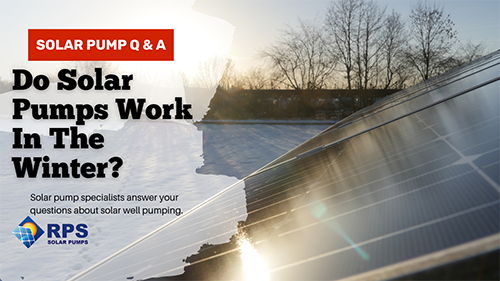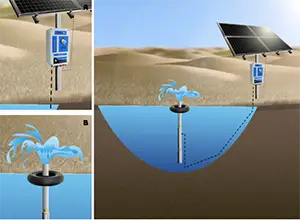Do Solar Pumps Work In The Winter?
Today’s question is, “Do solar pumps work in the winter?” So the short answer is yes. Solar pumps work just fine in the winter. If you are going to pump over the winter-time, when you’re setting up your system and planning, there’s a couple of considerations we want to take into account to make sure it’s going to work reliably all season long.
So, our solar panels are gathering light from the sun. After a big snowstorm, you might need to go out and dust off your panels so they can begin gathering light again. What other customers do is shift the angle on their panels slightly steeper and more vertical. This helps in the winter when the sun is lower in the sky: the panels will collect more sunlight and the snow slumps off the panels more easily, limiting the need to go out and clean them off.
When initially planning out your system in a freezing environment, there are a couple of things we want to take into account to make sure your pipes don’t freeze. There are a few different options we can use here. First of all, if you’re going to open discharge, say into a stock tank or storage tank, then you can have a self-draining system by not installing a check valve in your pump or by putting a deep hole into your drop pipe, and that’ll allow the water to run back out of your line.
When this pump is done pumping, all the water drains and then during the hard freeze, it doesn’t freeze in your lines and break up. The other thing you can do in a freezing environment is you can use what’s called a pitless adapter. The good thing about this adapter is it keeps all of your plumbing down below the frost line. To install the pitless adapter, we dig down below our well casing; we want to go below the frost line for your specific area. Most times that’s between 3 and 5ft deep.
The good news is, all the plumbing is below the frost line, so there’s no possibility of it freezing. Another consideration for winter-time pumping is, because the sun is low in the sky and our day is shorter, we’re generally going to have less water than in summer. All of our sizing systems plan for six hours of pumping a day, which is safe for wintertime. And in summer you’re going to get more like 8 to 10 hours of pumping a day.
With less sun in the sky, there are a couple of steps you can take. One is you can tilt your panels up more. Like I mentioned before, that will help gather more sunlight. We also have backup options, whether we’re using batteries or a generator. In the winter time you’re more likely to have some cloud cover and having either water storage or power backup options are great if you have to get out and pump some water.
So solar pumps are going to work great for you all winter long, and with a little upfront planning, you’re going to be able to make sure you have consistent water supply, whether you have a hard freeze, a snow storm, or extended cloud coverage.


